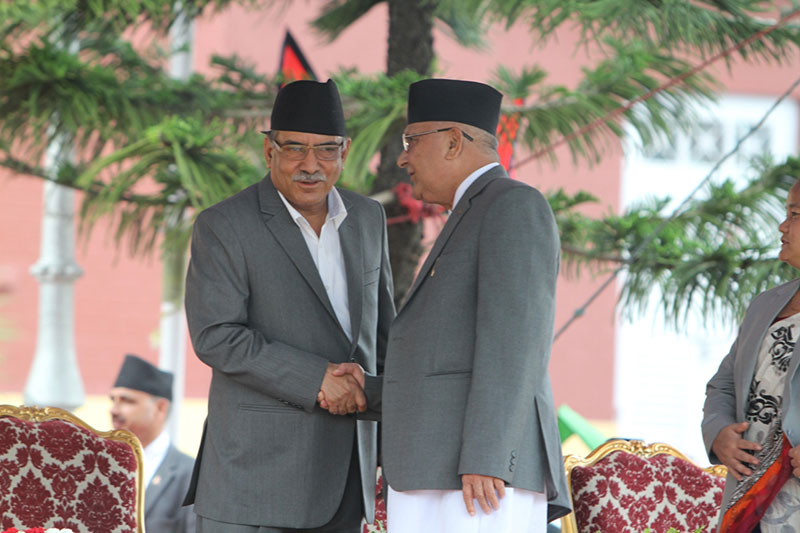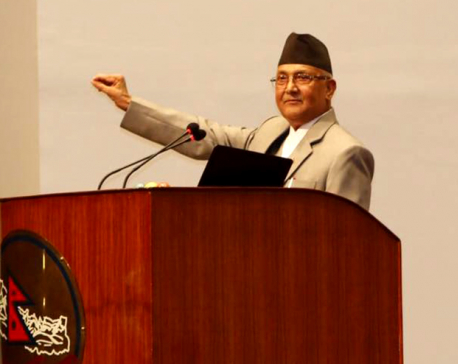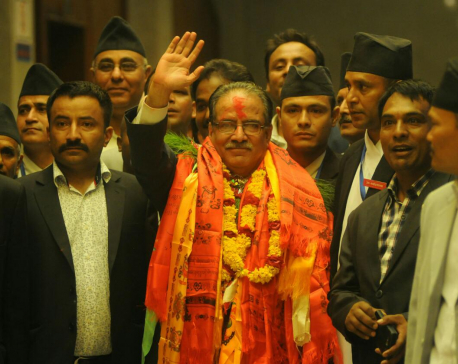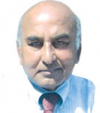
OR

If he wants to be more successful this time, Prachanda should embark on quick grassroots initiatives that appeal to a broad section of society
It was unnecessary for Comrade Prachanda to spend seven of his most productive years in political wilderness, following his forced resignation as prime minister in May of 2009, just nine months into office. This was a debacle he has come to greatly regret.
Prachanda’s earlier decision to lay down arms and align with democratic forces to fight for the end of monarchy had played a key role in the peaceful transfer of power. It was, indeed, a rare occurrence for a revolutionary leader and for the gorilla outfit he had built up to turn to peace and commit to democracy, even when a total victory was in sight.
However, it was soon clear that Prachanda’s change of heart was less than genuine and more likely it was a strategic move to acquire absolute power using democratic channels. He assumed that all else would fall into place—political parties, courts, bureaucracy, social outfits—after he got complete control of the national army.
Unexpectedly, he found the army a hard nut to crack. With an unsupportive President and also the fear of looming Indian intervention in the event of bloodshed and disorder, Prachanda chose not to take up a fight with the army and, feeling undermined, resigned instead. Looking back, the epochal decision that Prachanda made seven years ago proved to be the most sensible. He could thus maintain his political stature and wait for a more opportune time to work his charisma.
Unrealistic vision
Prachanda hasn’t penned an autobiography, nor has anyone volunteered to do it for him; a book that will detail, among other things, what motivated him to opt for an armed revolution and how he wanted to end it. The only thing we know of his decision to take up arms was the miserable living conditions of common Nepalis and the government’s inability, even unwillingness, to help them.
Prachanda didn’t care what kind of government was in power—democratic or authoritarian. He didn’t see people’s lives improving until the system changed, by force if needed. That kind of frustration, most likely, pushed Prachanda and his comrades to opt for a revolution targeted at the ouster of monarchy, the source of feudal power and status quo.
To send a message that his intention was to make Nepal a ‘People’s Republic’ and use state power to equalize incomes and wealth, he labeled his revolutionary outfit Maoists. Such a labeling gave his movement name recognition and also an ideological anchor. However, he failed to recognize that Nepal’s history and culture and, above all, the country’s geopolitical realities would not let him put Maoist principles into practice, unlike what Mao managed to do with them in China a century ago.
It is thus strange that Prachanda and his colleagues chose to sit down with their democratic opposition to negotiate the ouster of monarchy, but also agreed to abide by competitive politics and rule of the majority. The democratic face of Maoism strengthened the opposition to monarchy and helped bring its quick end. Also, a negotiated change of political order gave the Maoists public acceptability and made it a favorite for winning the 2008 election, when it indeed emerged with the maximum seats in national parliament.
However, Maoist departure from democratic norms, as evident in Prachanda’s attempt to take over the army, quickly ended the ascendancy of Maoist party and cooled down their revolutionary zeal. During the seven-year intermission, it became imperative for Prachanda to seek a different route to return to power.
Building democracy
If he wants to be more successful this time around, Prachanda should embark on quick grassroots initiatives that can appeal to a broad section of society.
A clean-up of bureaucracy will be a good start, especially if this is focused on ending corruption that has undercut development efforts for generations. Anecdotal evidence suggests that at least half of development budget gets skimmed off even before a brick has been laid down, while the other half is wasted on shoddy projects. Picking up a fight to end such monumental corruption will produce visible results and earn him public goodwill in short order.
Another related area of corruption control promising immediate pay-off would be restraining customs, security and court officials who are known to extract big bribes. Such a measure against corruption will earn unprecedented goodwill for the new government.
Another focus area could be tighter supervision of entitlement spending—old-age pension and disability allowances, for example—much of which gets lost on its way to delivery. A clean-up of welfare administration will provide immediate relief to the needy and vulnerable sections of society without costing much to the treasury.
Other grassroots initiatives with quick pay-off will be improving public sanitation, water supply and roads and reducing load-shedding. A multi-billion-dollar budget is not needed for these improvements.
Another area of quick social gain—and electoral pay-off as well—is improving law and order situation for which Maoists have a bad reputation. Maoist leadership needs to curb unlawful activities by instituting stern punishments for criminals. Law and order must be a vehicle to ensure human rights that includes, above all, the right to own and transfer property.
Winning elections
We can’t say how long Prachanda will continue as prime minister, but most estimates of his tenure are capped at under a year. This short power-holding period relates to the Maoist party’s third place finish in the second CA polls and the expectation that the largest party in parliament—Nepali Congress—will soon reclaim leadership.
In any case, the Maoists must focus on winning a working majority or at least becoming the largest party after the next general election. A quick start on the social programs noted above should be a priority. They need not be implemented all in a hurry but a solid reform program announced from public platforms will help get the message to the people. As much as half of the battle for winning public support for Maoist agenda can be won just by turning the public dialogue in the direction of hope and a better life.
And Prachanda should trust the army more. To help heal the old wounds, he must dismantle his militia outfit, if he still has one, and depend exclusively on official security apparatus. Prachanda needs to believe that Nepal Army has no experience and no ambition of ruling the country on the pattern, for example, of Pakistan and Thailand. It just wants to remain a national army under civilian authority.
Finally, Prachanda must reconsider his approach to international relations, especially his dealings with India, which will be crucial for his long-term survival. He also should shed his communist label to gain international acceptability. The next few months will show if he is really serious about governing and making a difference.
sshah1983@hotmail.com
You May Like This

The second coming
KP Oli had long established himself as a good leader but it was the Indian economic blockade that made him... Read More...

The second coming
Prachanda needs to set the ball rolling as quickly as possible and go about tackling the problems with speed and... Read More...

Second chance with India
The new rapprochement between the world’s two most populous democracies could shape the world’s future ... Read More...







Just In
- NRB to provide collateral-free loans to foreign employment seekers
- NEB to publish Grade 12 results next week
- Body handover begins; Relatives remain dissatisfied with insurance, compensation amount
- NC defers its plan to join Koshi govt
- NRB to review microfinance loan interest rate
- 134 dead in floods and landslides since onset of monsoon this year
- Mahakali Irrigation Project sees only 22 percent physical progress in 18 years
- Singapore now holds world's most powerful passport; Nepal stays at 98th












Leave A Comment